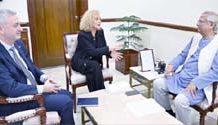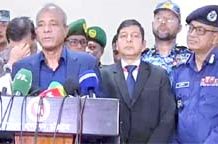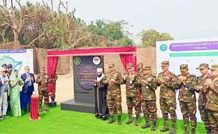C T Online Desk: The “Bangamata” Begum Sheikh Fazilatunnesa Mujib is always remembered with utmost reverence because of her enormous contributions to the Nation. What is generally recognized is that Bangamata was a successful woman to help Bangabandhu become the most successful leader in the world context. This fact holds a lot of water when one considers the life of Bangabandhu Sheikh Mujibur Rahman, known as the Father of the Nation in Bangladesh. He was the one who paved the way for Bangladesh to gain its independence.
The graceful name of Bangamata Begum Sheikh Fazilatunnesa Mujib, whom Bangabandhu affectionately referred to as Renu, is pronounced with the utmost respect in light of the protracted fight in making Bangladesh independent, the efforts of building the Nation, and the ups and downs of Bangabandhu’s life. This name is spoken about the topic mentioned above. Whenever we discuss Bangabandhu and his accomplishments, her unavoidable presence emerges as an evident and consistently motivating influence. This is because she was Bangabandhu’s wife. Therefore, it was Bangamata Begum Mujib herself who contributed to the making of a young Sheikh Mujib’s gradual progress of becoming Bangabandhu and the Father of the Nation. Bangabandhu’s life events had been actual at each stage, from the name, Khoka to Bangabandhu and from Bangabandhu to the Father of the Nation. Even though mainstream Bangladeshi historians have, for the most part, maintained an astonishingly silent stance regarding our Bangamata, the Father of the Nation himself has fondly and respectfully mentioned her name on several occasions throughout his Unfinished Memoirs and Prison Diary.
According to The Unfinished Memoirs, Bangamata was only three years old when their Father passed away, and her older sister was only five years old. Just two short years after the passing of her Father, their mother also passed away. These two girls did not have a biological parent, so their grandfather, Sheikh Md. AbulKasem took on the job of raising them. The marriage between Bangamata and Bangabandhu was arranged in accordance with the wishes of Bangamata’s grandfather. The following is how Bangabandhu remembers the event as he writes about it in The Unfinished Memoirs:
“I was possibly around 13 years old when I got married, if not a little younger. After the passing of Renu’s father, her grandfather gave my father a call and said, “You will have to marry off your eldest son to one of my granddaughterss. This is because I want to leave all of my possessions to my two granddaughters when I die. My grandfather’s uncle was Renu’s grandfather, and my father insisted that I marry her because he was related to both of our families byn marriage.” (p. 6)
When Bangamata’s mother passed away, she moved in with Bangabandhu’s family. She eventually discovered that her mother-in-law, Sayera Khatun, was a better mother to her than her own mother. In fact, she was still a child when she got married, and for all intents and purposes, she came of age with her husband and his siblings, participating in various youthful activities. Bangamata did not start taking on her role as a responsible family member until after Bangabandhu had already been accepted into Calcutta Islamia College in 1942. After successfully completing the entrance examination, Bangabandhu had already been there for a year. By that time, Bangabandhu had already involved himself in politics, and it was clear that Bangamata had provided her utmost assistance to the process of nation-building he was doing.
She gradually became the center of courage and inspiration that gave Bangabandhu unwavering optimism to push forward with the cause of improving the lives of the people of Bengal. Bangamata was a woman who sacrificed all of her own personal aspirations to support her husband Bangabandhu’s political career. She was never interested in gratifying any secret desires; instead, she prioritized accumulating as much money as possible to give to her young husband so that he could cover the costs associated with his political activities.
She carried on doing the same thing throughout the entirety of her life. In the words of Bangabandhu, “Whenever I went home, she would give me whatever she managed to raise so that I could fulfill my costs.” She would never refuse to help me in any way, and she would never treat herself to anything nice. (The Unfinished Memoirs, page 26) She was so devoted to the political cause of Bangabandhu that she did not hesitate to sell her jewelry to cover the costs of the party when Bangabandhu was being held in prison. She did this because she wanted to show her support for the political goal of Bangabandhu.
During the course of his political career, Bangabandhu was in prison for almost 14 years. During that time, Bangamata was responsible for raising the family, ensuring that the children received an education, managing party activities, and providing medical attention to hundreds of party workers. She accomplished all of these things without making any complaints and in a manner that was quite maternal. Bangamata could not enjoy Bangabandhu’s close presence for extended periods from the very beginning of their married life. This was due to Bangabandhu’s hectic political schedules or imprisonments; however, the undercurrent of their conjugal love was so strong that they became genuine soul mates to one. They overcame the most difficult times by relying on each other’s trust and respect throughout the ordeal. The Bangamata was the source of a great deal of inspiration for Bangabandhu and, on many occasion, she gave Bangabandhu some suggestions. During the times that Bangabandhu was away from home, Bangamata would spend her time reading a wide variety of books, and then she and Bangabandhu would talk about the topics covered in those books.
These conversations occasionally veered off into political ones. As a result, Bangamata expressed her ideas with Bangabandhu regarding the conditions of the people and the state and political strategies. When the Ayub Khan Regime in 1969 wanted the imprisoned Bangabandhu to join a meeting in Lahore on parole, Bangamata prevented Bangabandhu from accepting that, and Bangabandhu denied the idea as a result. Since this choice was followed by the widespread uprising of 1969, which got Bangabandhu free from prison and declared him the unanimous leader of the people of Bangladesh, it was shown to be a significant and historical decision. This is because this decision was followed by the mass uprising of 1969.
Bangamata Begum FazilatunnesaMujib was the ideal company for Bangabandhu as he navigated the perilous heaves and sways of his turbulent life. She was possibly the single factor that contributed to Bangabandhu’s decision to become an author. The Bangamata encouraged Bangabandhu to write his memoirs and keep journals because of breaking away from the redundancy of his reality in prison. Even though he was behind bars, she maintained a correspondence with him by sending notebooks. The fact that Bangabandhu has left his memoirs and diaries, which, are of a great blessing for the present generation and the Nation. Let us extend our thanks to these happenings for our understanding the factual incidents through the battle for the freedom of our land and people. This has been a boon that the Nation will benefit from for a very long time.
Bangamata was a courageous woman who laid her life on the altar of freedom for her people. She gave up some of the most beautiful moments of her life to do so. She was a person of the enormous heart. She triumphed over all of her tribulations to fight for the rights of Bengalis. She never sought attention for herself and was never interested in promoting her own reputation; instead, she remained the loyal companion, leading counsel, and major well-wisher of the Father of the Nation. I am proud to pay tribute to her memory today in honour of the date that marks the anniversary of her birth.
Salute, Bangamata Sheikh Fazilatunnesa Mujib
The author is an academic, writer, researcher, Folklorist, Professor English and the former Pro-Vice-Chancellor, Islamic University, Kushtia, Bangladesh















